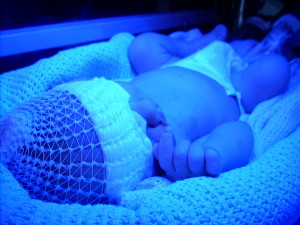Babies and Jaundice
We have had quite a few questions about jaundice in the recent months. Here are some facts about newborn jaundice.
Jaundice is a common condition in newborn babies; particularly infants that are breastfed or that were born before 38 weeks gestation. There is also some evidence that delayed cord clamping can increase jaundice levels. Jaundice is caused when the liver is not mature enough to clear bilirubin from the body. Bilirubin is excreted through feces, so frequent bowel movements are important in newborn babies. Jaundice is the breakdown of red blood cells, which are then filtered through the liver.
Bilirubin presents in most infants between day 2 and 4 and levels usually peak around days 4-7. As most babies are discharged before 72 hours of age, it is recommended that babies see a family doctor or paediatrician within two days of discharge. Symptoms for parents to watch for include yellowing of the skin, whites of the eyes, and gums.
Generally the yellowing of the skin is most obvious on the face. If the skin has yellowed on the abdomen or extremities, baby is listless or lethargic, or the jaundice lasts more than three weeks, it is important to discuss the situation with your child’s Doctor.
When an infant first presents with jaundice, treatment may not be necessary. Depending on the bilirubin levels and the age of the infant, it is likely that jaundice will pass with not oh her interventions. Parents may be advised to feed the baby more often, to supplement, or to hand express and cup or spoon-feed the baby. This will help to the baby to have more frequent bowel movements and excrete the bilirubin.
If bilirubin levels continue to rise or do not decrease with increased feedings, further treatment may be required. The most common form of further treatment is phototherapy. The baby is placed under lights on the blue-green spectrum, which alters the bilirubin and allows it to be more easily excreted through urine and feces. The light is not harmful to the baby and they will wear protective eye patches to be safe. This type of therapy may be supplemented with a special mattress or blanket. In extreme cases, a baby may need to undergo an exchange transfusion where their blood is removed and filtered in small amounts. Thankfully, this is extremely rare.
Jaundice is a medical condition which requires medical supervision and assistance. As your doulas, we cannot advise you on treatment for jaundice. However, we know that jaundice and jaundice treatment can be unnerving for new parents. Your doulas are there to support you through this uneasy time. We may also be able to help you with hand-expression and communication with your child’s care team. And we will celebrate with you when your baby is ready to come home!

